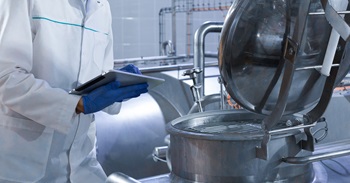Why Dietary Supplement Manufacturers Need to Be Proactive
By Avery Collins, FMI
Ensuring the quality of dietary supplements relies on rigorous attention to ingredients, supply chains, and proactive  testing. Compliance with these standards is essential for food safety, safeguarding brand reputation, and building trust with consumers.
testing. Compliance with these standards is essential for food safety, safeguarding brand reputation, and building trust with consumers.
Our recent SQF365 digital seminar on food safety and compliance in the dietary supplement industry brought together Tyler Williams, Carey Allen, and Jackie Bowen to discuss critical aspects of maintaining these high standards in the rapidly growing sector. The conversation analyzed consumer trust, the evolving landscape of industry regulations, and the measures necessary to ensure product quality and safety in the future.
“SQF is a pivotal part of that long-term strategy for dietary supplements," said Jackie Bowen, executive director of the Clean Label Project. "Knowing the direction that the industry is going, we're not seeing it go in reverse; there's not going to be less regulation and fewer expectations. It's about more and SQF keeps pace with that.”
The digital seminar emphasized the need for the dietary supplement industry to adopt proactive approaches to food safety and quality. This means not just meeting current standards, but also anticipating future regulations and consumer expectations. A key point of discussion was the importance of proper lab accreditation.
The Importance of Proper Laboratory Accreditation
Accredited labs play a crucial role in ensuring that testing and quality assurance processes meet established standards, thereby reducing the risk of contamination and guaranteeing the safety of dietary supplements for consumers. Independent oversight further strengthens this framework, as third-party verification provides an extra layer of credibility and reliability to the safety measures implemented by manufacturers.
Adherence to the higher standards offered by SQFI is increasingly necessary for mainstream retail acceptance worldwide. SQF is an accredited certification program with a standardized benchmark that aligns with the industry's evolving regulatory landscape, making it pivotal for both short-term objectives and long-term strategies in the rapidly growing dietary supplement industry.
"SQF is a leader in third-party certification, and we understand the value of independent oversight in this industry," said Carey Allen, vice president of SQFI business development and strategy. "Retailers trust the SQF code for assuring consumers that the products on the shelf are safe.”
Why SQF Certification Makes Sense
1. Building Consumer Trust and Brand Reputation
SQF certification serves as a mark of quality with both consumers and retailers. By achieving SQF certification, dietary supplement manufacturers can effectively communicate their commitment to safety and quality.
2. Reducing Audit Burden
With SQFI’s comprehensive audit process, manufacturers can avoid the need for multiple audits from different retailers or certifying bodies.
3. Futureproofing Against Regulatory Changes and Meeting Retailer Requirements
The regulatory landscape for dietary supplements is continually expanding and retailers are increasingly mandating new certifications to ensure that their suppliers adhere to the safety standards. SQF certification helps manufacturers stay ahead by implementing higher standards that anticipate future regulatory requirements, making it easier to establish and maintain partnerships with major retailers.
SQFI provides resources and support to help manufacturers achieve and maintain certification. Training, online resources, and detailed guidance are all available to ensure that you are well-prepared for the certification process.
Decoding Dietary Supplements: Using SQF's Code as a Fast-track to Mainstream Retail
Our SQF365 digital seminar with ASI Food Safety and the Clean Label Project centered around ensuring food safety and compliance in the rapidly expanding dietary supplement industry.
To learn more about the benefits of the SQF code for dietary supplements, watch our last SQF365 digital seminar, Decoding Dietary Supplements: Using SQF’s Code as a Fast-track to Mainstream Retail.
Recent Blog Posts
SQF Code Edition 10 represents a critical step forward in ensuring rigorous yet practical food safety management across the supply chain.
In an industry where compliance and operational integrity are nonnegotiable, manufacturers and suppliers need more than just certification — they need a globally recognized solution.
Renee McVey is one of the first industry professionals to hold the Safe Quality Food Institute’s new Certified SQF Practitioner credential, which is administered by Exemplar Global.




